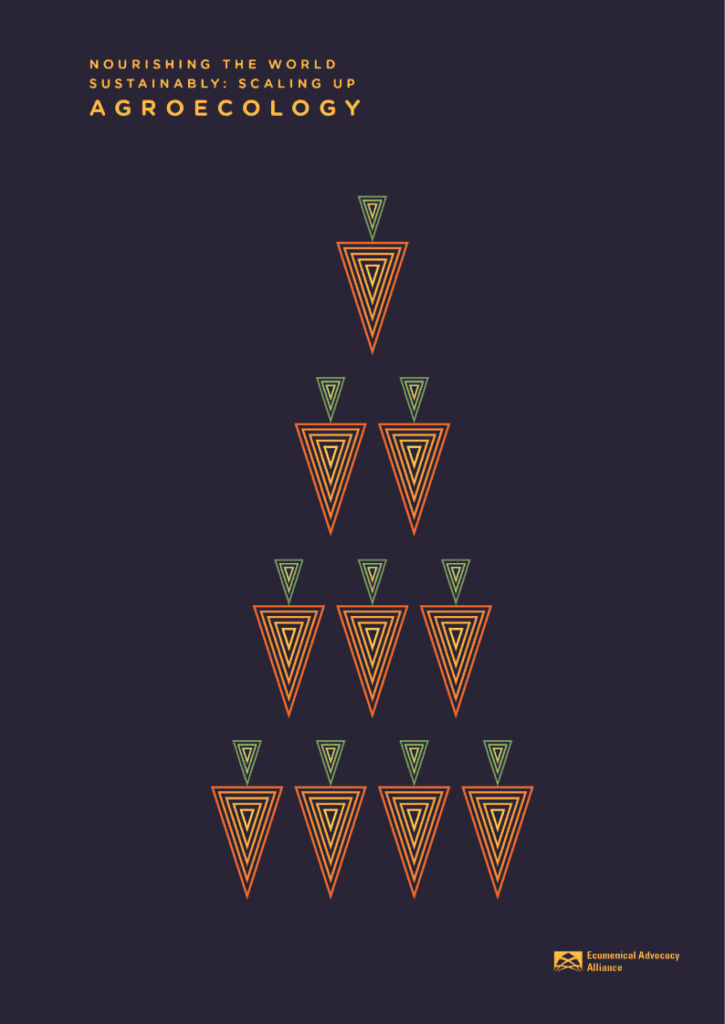ACT Alliance Agencies contributed to a publication entitled ‘Nourishing the World Sustainably: Scaling up Agroecology’. This report argues that agroecology, which uses ecological concepts and principles for the design and management of sustainable agricultural systems, has consistently proven capable of sustainably increasing productivity, and has far greater potential for fighting hunger, particularly during economic and climatically uncertain times.
Main findings
Agroecology works. The experience of farmers and food-producing communities around the world using agroecological methods has provided a growing body of evidence of the economic, social and environmental benefits of these methods. Agroecological approaches have delivered increased food production and improved income for farmers, and enhanced food security and nutrition for the communities they feed.
These approaches have very low transaction costs and exhibit huge returns on investment. By the same means, agroecology delivers the social benefits associated with poverty reduction and community empowerment. And in a context of global climate change and environmental degradation, agroecology delivers the environmental benefits of lower resource use, reduced environmental impacts both on- and off-farm, and protection of biodiversity, while at the same time enhancing resilience against the shocks associated with accelerating climate change.
Replicating industrial-scale monocropping and food production utilizing fossil-fuel based synthetic inputs throughout the world is neither desirable nor possible. It is time to challenge our assumptions regarding food production and consumption and face up to planetary boundaries and limits to productivity.
Agroecology is scalable. It has been spread and applied by many farming communities around the world, primarily through a process of farmer-to-farmer knowledge sharing. Its main inputs and investments are information and best practices, knowledge of local conditions, and the natural resources of local ecosystems.
It is not dependent in the long run on chemical fertilizers, pesticides or transgenic crops, which are costly for small-scale farmers and often resource-depleting. It can be, and indeed already has been, scaled up to reach millions of farmers and millions of hectares in Africa, Asia and the Americas. The challenge now is to equip a much larger proportion of the world’s smallholder farmers – who produce most of the world’s food – with agroecological knowledge and skills.
But agroecological methods of food production – and the local traditional knowledge and ongoing farmer-to-farmer exchange of best practice on which they are founded – have not attracted the investment for research or support for broader information networking among smallholder farmers that would be required for more massive scale-up.
Agroecology can feed the world. Despite the expansion of environmentally destructive high-intensity industrial ‘Green Revolution’ agriculture, most of the food consumed worldwide is still produced by smallholder farmers. By increasing the nutritional yield and reducing the environmental impact of smallholder farms through the application of agroecological methods, while at the same time addressing the issues of food waste and market access for smallholder farmers, the challenge of feeding nine billion people by 2050 can be met – sustainably.
Agroecology will be necessary if we are to find a viable path through the intertwined challenges of future food security, and climate change mitigation and adaptation. In the context of climate change, business as usual in the field of food production is not an option. Agroecology offers the prospect of sustainable food production to meet the needs of a still-growing global population, while at the same time reducing the GHG emissions from the agricultural sector, building resilience to already unavoidable climate change, protecting biodiversity, and sustaining communities and rural livelihoods.
The way forward
The key steps forward if we are to pursue this path will include:
- Much greater investment in research on agroecological food production methods, building on traditional knowledge and existing best practices, to enhance smallholder-based, low-emission, high-productivity agriculture in the context of climate change.
- Increased support for the establishment and expansion of farmer-to-farmer networks at local levels throughout the developing world, for the sharing of information and best practices in agroecological food production, as the key instrument for scaling up agroecological food production in food insecure areas.
- Enabling policy environments at national and international levels, recognizing the central role of smallholder farmers in global food security and supporting smallholder-based agroecological food production, and agroecological extension programs at national and local levels.
- Increased support for the establishment and expansion of smallholder farmers’ collectives, to improve market opportunities and the collective capacities of smallholder farmers and their communities.
- More effective regulation and management of the negative impacts of corporate influence on agricultural policy and practice, including the unconstrained promotion of dependence on proprietary technologies such as transgenic crops and chemical fertilizers.
- More focused and effective attention to reducing food waste throughout the food supply chain, from point of production (especially by improving local access to storage, processing and transportation infrastructure for smallholder farmers in the developing world) to point of consumption (especially by challenging consumer behaviours and the waste resulting from quality standards in the developed world).
